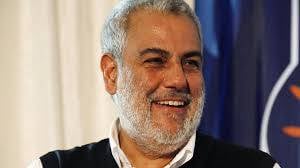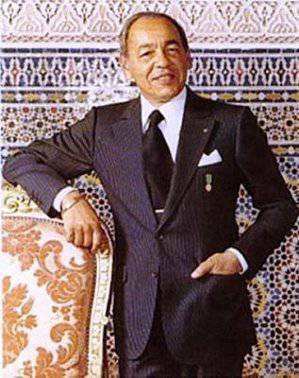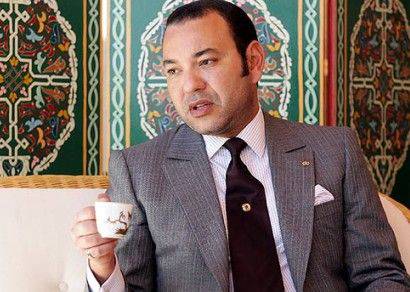Morocco: political stability and religious fundamentalists in the “pearl of the Maghreb”

Morocco stands alone among the North African states. Despite the fact that the country, of course, there are numerous social and economic problems, Morocco, nevertheless, manages to maintain political stability. This is what distinguishes the country from all neighboring states - Mauritania with periodic military coups, Algeria with bloody opposition of fundamentalists and the government, Tunisia, where during the Arab spring the regime of Ben-Ali, Libya, in which after the fall of Gaddafi came true chaos, Egypt, where, in spite of the tough military regime, the opposition of radical fundamentalists and government forces continues.
The political situation in Morocco differs significantly from the situation in other countries of North Africa and the Middle East. First of all, these differences are connected with the form of government in the country. Morocco is a constitutional monarchy. It is a much more traditionalist state than the rest of North Africa. The ruling dynasty of Alauitov has been in power in Morocco since the middle of the 17th century. The genus Alauitov came from Tafilalta and erected its origin to the sheriffs - descendants of Hassan, the grandson of the Prophet Muhammad. Although France established a protectorate over Morocco in 1912, and only 2 in March 1956 did the country regain full political independence, the Alawit dynasty retained its power. In 1957, after independence was proclaimed, the title of monarch was changed - now the ruler of Morocco was called not the sultan, but the king, which was associated with European cultural and political influence and the position of the then monarch Mohammed V (1909-1961) - the man who received not only traditional Muslim, but also modern European education.
The royal power of a dynasty that has been ruling for more than three hundred years naturally looks much more legitimate for a person from a traditional society than the power of dictators or elected presidents who came to power as a result of military coups. In the Arab world, the King of Morocco has always been highly respected, if only because after the overthrow of the monarchy in Egypt and Libya, Morocco remained the only Muslim monarchy on the African continent. In addition, Morocco has always claimed a special role in African and Arab politics. The leaders of this country have chosen a wise path of cooperation with both Arab and African countries, and with the West. In turn, the United States and European countries have always considered Morocco as the most reliable partner in North Africa. This was facilitated by the participation of Morocco in support of conservative regimes in African countries. Morocco’s special relations with the West contributed to the fact that the country began to play a mediating role in many conflicts in the Middle East and Africa. In particular, Morocco participated in the preparation of the Israeli-Egyptian talks at Camp David; it was in Morocco that Egyptian President Anwar Sadat and Israeli Prime Minister Menachem Begin met for the first time to discuss the possibility of a peace agreement.
 The previous King Hassan II of Alaoui (pictured), who ruled Morocco from 1961 to 1999, also headed the Committee of AL QODS from 1979, uniting the heads of state of the Arab world. In an effort to protect his regime from attempts to overthrow and seeing before him a sad example of the fate of the monarchy in Libya, Hassan Alawi severely suppressed the activities of opposition political organizations. But, despite the allegations of human rights violations, the king met with the support of Western countries, who saw the Moroccan regime as a natural ally in the fight against the Arab left-nationalistic regimes of Algeria, Libya, and Syria, which enjoyed the support of the Soviet Union. Hassan II survived two assassinations, organized by the Moroccan military, dissatisfied with their policies. It was during the reign of Hassan II that the Justice and Development Party, which has been in power in the country in recent years, began its activities. Prior to 1998, it was called the “Popular Constitutional Democratic Movement Party” (PKDD). In the 1999 year, after the death of Hassan II, Mohammed VI Alaoui became the king of Morocco - a young man (he was born in 1963 year) and focused on real political changes in Morocco, including the possibility of cooperation with the moderate opposition.
The previous King Hassan II of Alaoui (pictured), who ruled Morocco from 1961 to 1999, also headed the Committee of AL QODS from 1979, uniting the heads of state of the Arab world. In an effort to protect his regime from attempts to overthrow and seeing before him a sad example of the fate of the monarchy in Libya, Hassan Alawi severely suppressed the activities of opposition political organizations. But, despite the allegations of human rights violations, the king met with the support of Western countries, who saw the Moroccan regime as a natural ally in the fight against the Arab left-nationalistic regimes of Algeria, Libya, and Syria, which enjoyed the support of the Soviet Union. Hassan II survived two assassinations, organized by the Moroccan military, dissatisfied with their policies. It was during the reign of Hassan II that the Justice and Development Party, which has been in power in the country in recent years, began its activities. Prior to 1998, it was called the “Popular Constitutional Democratic Movement Party” (PKDD). In the 1999 year, after the death of Hassan II, Mohammed VI Alaoui became the king of Morocco - a young man (he was born in 1963 year) and focused on real political changes in Morocco, including the possibility of cooperation with the moderate opposition. When events called “The Arab Spring” broke out in 2011 in a number of Middle Eastern and African countries, Mohammed VI responded to them quickly and sensibly. He decided not to suppress the fundamentalist opposition, but to allow moderate Islamists to take an active part in the political life of the country. Willingness to share power with the opposition and saved the Moroccan regime from the fate of the Egyptian, Libyan, Tunisian, Yemeni regimes. Although, on the other hand, the United States and NATO were not at all interested in overthrowing the monarchy and destabilizing the situation in Morocco, therefore the Moroccan opposition did not receive the informational and material (and in the Libyan case, military) support received by radical organizations in other countries.
It should be noted that the Justice and Development Party took part in the elections to the Moroccan House of Representatives for the first time back in 1997, when it was called the Popular Constitutional Democratic Movement Party. However, then she did not achieve serious success - from 325 seats in the House of Representatives, the party received all 9 seats. But, on the other hand, it was also quite a lot, considering that until 1997, religious and political organizations were not represented in the Moroccan parliament. A further increase in the popularity of the party was associated not only with its emphasized orientation towards conservative values, but also with the social component. Despite the high level of political stability compared with other African countries, social polarization is very high in Morocco, there are many unemployed and poor people. Tens of thousands of Moroccans regularly leave the country, going to work in Europe. Many of them fall under the influence of radical fundamentalist organizations, which also speculate on social problems, connecting them with the “immorality” and “injustice” of secular political regimes in Arab and African countries. Given the numerous socio-economic problems of Morocco, in 2011, the scenario of a possible uprising of protest-minded masses of disadvantaged Moroccans, which could be led by radical fundamentalists, was not excluded. But a balanced policy of the country's leadership prevented this development.
In July, 2011 adopted an amendment to the Constitution of Morocco, according to which freedom of speech was significantly expanded, as well as the powers of the government and the prime minister. In the early parliamentary elections, the Justice and Development Party won a landslide victory and won a relative majority in the Moroccan parliament. It also became a fateful event - for the first time a religious-political party formed the government of Morocco. True, three secular political parties took part in its formation, but this circumstance only made the Moroccan government more confident and balanced.
What explains the five-year success of the Justice and Development Party among the Moroccan voter? Firstly, the Justice and Development Party has been involved in Morocco’s parliamentary policy relatively recently. This favorably distinguishes it from other political parties represented in parliament, regardless of the ideological orientation of the latter. Moroccans less and less trust the "old" political parties, since the activities of previous governments did not lead to any significant changes in the social and economic situation of the majority of the population. A significant part of the Moroccan population lives below the poverty line, every fifth Moroccan and every third Moroccan under the age of 30 years are unemployed. And this is against the background of the real prosperity of the political elite of the country, ranging from the royal family and ending with corrupt officials. For decades, Moroccan political parties have not taken any real steps towards changing the existing situation. Naturally, such behavior caused dissatisfaction with their activities on the part of the majority of Moroccans.
Secondly, in Morocco, a high level of corruption. Since the Justice and Development Party, until the end of 1990, was not a parliamentary party at all and did not participate in the formation of government bodies, it was on the list of practically non-corrupted political forces, which also could not but arouse sympathy and respect from the masses. Voters who voted for the AKP believe that the party will sooner or later be able, if not to end corruption in government, then at least substantially reduce it. Therefore, the Justice and Development Party won the votes of both fundamentalists and many other people interested in updating the Moroccan political regime. Moreover, the political platform of the Justice and Development Party can hardly be called typical for fundamentalists. Strictly speaking, the AKP is an atypical Islamist party. Its slogans - Islam, respect for constitutional monarchy and condemnation of violence - fit well into a centrist political platform that does not threaten the existing political system.
The moderation of the Justice and Development Party allowed the royal regime of Morocco, without any particular problems, to build a line of relations with this party and with the government headed by it. The Justice and Development Party intends to develop Morocco’s trade with the EU countries, including through the creation of free economic zones, which already testifies to its moderation, since radical fundamentalists oppose the development of ties with the West. In the social sphere, the party seeks to increase the pace of construction of social housing, to gradually solve the problem of unemployment, which is very acute for the country. The project “A City Without Slums” implies the relocation of disadvantaged Moroccans to social housing, which will contribute to improving the quality of life of the population. The party is also concerned about the development of education in the country. In Morocco, a really depressing situation in the field of education. So far, 30% of the country's population is illiterate. Every third Moroccan does not know how to read and write. Naturally, the illiteracy of a third of the population in the modern world is a major impediment to the country's socio-economic development. Therefore, the AKP stands for the fight against illiteracy, but knowing full well the scale of this goal, so far realistically it speaks only of a decrease in the illiteracy rate from 30% to 20% of the country's population.

During the five years in power, the AKP has shown that it is a moderate party that will not pursue a policy of “returning to the Middle Ages”, which the party was criticized by critics from among representatives of “secular” political organizations. King Mohammed VI (in the photo) was able to reach an agreement with the AKP and Morocco maintains political stability, although protests take place in the country with a high frequency. The fact is that the longer the AKP is in power, the more clearly ordinary Moroccans understand the absence of any major changes in their social and economic situation. Beautiful goals and the right tasks are, of course, good, but only when they are implemented in practice. For the time being, the AKP succeeds, although slowly, but still improves the economic and social situation in the country. The main opponent of the existing system is now radical radical groups of fundamentalists who are not members of parliament and are considered in the country as extremist organizations.
Morocco’s largest opposition organization, Al-Adl Wal-ishan, has several hundred thousand supporters and is in favor of eliminating the constitutional monarchy and replacing the power of the king with the authority of the council of ulama. In contrast to the Justice and Development Party, which supports the constitutional monarchy, this organization considers the only possible way for the political and economic development of the country to be the construction of an Islamic state. True, we must pay tribute, “Al-Adl wa-l-ihsan” rejects the violent way of coming to power and seeks to legal political activities. This cannot be said about more radical groups, which, however, Moroccan special services are actively fighting. Considering that in Morocco itself, counterintelligence quite severely suppresses radical organizations, a significant part of the Moroccan radicals long ago moved to Europe. Among the terrorists who participated in the terrorist attacks in Belgium and several other European countries were immigrants from Morocco. Today, for the Moroccan leadership, the main task is to prevent the strengthening of extremists and preserve political stability in the country. Power structures remain a reliable bulwark of stability in the country. We will tell about them in the following material.
Information